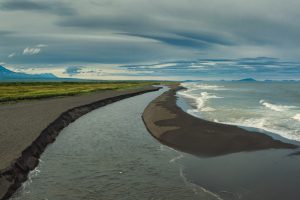
Environmental Engineering and Science Program Overview
Learn from acclaimed scientists in the Johns Hopkins Engineering for Professionals environmental science and engineering master’s degree program that teach the proven engineering techniques and management tactics you need to advance your career. Sharpen your ability to construct and evaluate environmental health risk assessments, craft a data-driven response to climatic trends and extreme events resulting from global climate change, and design solutions for practical fluid mechanics problems.
Comparing Engineering For Professionals Environmental Programs
At Johns Hopkins Engineering for Professionals, we offer three different programs that cater to various aspects of environmental engineering. Each program offers a master’s degree, Post-Master’s certificate, and graduate certificate option.
- The Environmental Engineering program focuses on the design of environmental engineering processes, infrastructures, remediation technologies, and treatment.
- The Environmental Engineering and Science program focuses on the fundamental concepts of physics, chemistry, biology, and geology as applied in the context of environmental issues, with less emphasis on design and management.
- The Environmental Planning and Management program focuses on the relationships between environmental engineering/science and public policy analysis and the role of economic factors in the environmental management and water resources planning using decision-making tools.
If you have additional questions about the differences between these programs, please reach out to our admissions team who can help you find the program best for you.
Programs
We offer multiple program options within Environmental Engineering and Science; you can earn an MS in Environmental Engineering and Science, a Graduate Certificate, Post-Master’s certificate, or a Climate Change, Energy, and Environmental Sustainability Graduate Certificate.
Environmental Engineering and Science Courses
Get details about course requirements, prerequisites, focus areas, and electives offered within the program. All courses are taught by subject-matter experts who are executing the technologies and techniques they teach. For exact dates, times, locations, fees, and instructors, please refer to the course schedule published each term. Focus areas for the MS in Environmental Engineering and Science require specific courses to complete.
Climate Change, Energy, and Environmental Sustainability
As the world's population increases and technological advances accelerate, demands for natural resources and energy continue to threaten Earth's physical and ecological systems. Through any of our environmental science degree programs, you will learn to design and implement solutions to address these challenges. Earn this graduate certificate with just 5 courses.
Program Contacts
-
Hedy Alavi
Program Chair Climate, Energy, and Environmental Sustainability, Program Chair Environmental Engineering, Program Chair Environmental Engineering and Science, Program Chair Environmental Planning and Management Email:alavi@jhu.edu
Email:alavi@jhu.edu
-
Christopher Overcash
Program Manager Climate, Energy, and Environmental Sustainability, Program Manager Environmental Engineering, Program Manager Environmental Engineering and Science, Program Manager Environmental Planning and Management Email:coverca1@jhu.edu
Email:coverca1@jhu.edu
-
 Email:hayley.beach@jhuapl.edu
Email:hayley.beach@jhuapl.edu
-
Email:meghan.stewart@jhu.edu
Tuition and Fees
Did you know that 78 percent of our enrolled students’ tuition is covered by employer contribution programs? Find out more about the cost to complete your part-time, online environmental science degree, including tuition for prerequisite and program courses and the Dean’s Fellowship.
“I enjoyed the ease of the application process, the ability to take electives in different engineering fields, field trips offered by some of the classes, the assistance from the professors and staff when I had issues, and the integrating aspects of the professional aspects of the engineering field not often seen in an undergrad course. For instance the Fluid Mechanics class included an overview of different types of pumps and valves and assigned a project that, among other things required us to select from the industry’s existing pump and valve types when appropriate. It made the assignment feel realistic. ”
Why Hopkins?
Earn a masters in environmental engineering and science online, part-time and from an institution that connects you to the latest technology and techniques.

Expert Faculty - Study with faculty who are practicing scientists and notable professionals with corporations and government entities, including the Johns Hopkins Applied Physics Lab, NASA, Raytheon, and the U.S. Department of Defense. Exceptional one-on-one mentoring sets you on a course to be a confident, knowledgeable leader.

Beyond Rankings: We help you fulfill your vision. - We are proud to be ranked among the top online graduate engineering schools by U.S. News & World Report. But we’re about more than just numbers and rankings—we’re focused on making sure you flourish as a learner and engineer.
Network and Connect - Your knowledge is stronger with a network. In the applied and computational mathematics program, you will make career-advancing connections with accomplished scientists and engineers who represent a variety of disciplines across many industries.
“What I liked about this program was that it was easy to do while working full time and it was applicable to my work. There were many technical and non technical things I learned I was able to apply right away towards my job. The professors were also flexible with due dates knowing everyone was also working. ”
Environmental Engineering and Science Program FAQs
Engineering careers that deal with the environment are diverse and varied. Depending on the exact career you see yourself pursuing as an environmental engineer, there may be several degrees that fit your needs. Environmental Engineering and Science specifically focuses on the science basics applied in the context of environmental issues. This environmental science master’s program works well for those looking for research positions.
If the online environmental science degree program isn’t a perfect match for your interests, you should also explore the Environmental Engineering program and the Environmental Planning and Management program, also offered by EP. If you have additional questions, reach out to our admissions team.
Environmental scientists collect and analyze sets of data like other scientists in other fields to measure the impact of changes to an environment and to determine helpful courses of action. Environmental engineers apply engineering principles to questions about infrastructure, building, and industrial operations to ensure more environmentally-friendly outcomes.
Holders of a masters in environmental science pursue careers in fields including ecology, geology, and biology can apply their experience in a variety of industries that connect to environmental issues. Students may pursue careers in agriculture, become air pollution analysts, nature conservationists, or with environmental chemists.
Academic Calendar
Find out when registration opens, classes start, transcript deadlines and more. Applications are accepted year-round, so you can apply any time.



